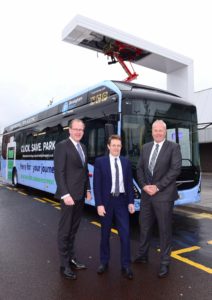
Birmingham Airport has launched a fleet of six new electric buses – and has designed its charging infrastructure to enable other bus operators to use it in future.
The Volvo buses, which take passengers from car parks to the terminal, are charged while en route via ‘opportunity charges’, essentially top-up charges, which take up to six minutes.
These are delivered by two overhead ‘pantograph’ charging systems. The infrastructure, developed with ABB and Siemens, can provide 150kW and 300kW charging capability, while each bus houses four 50kW lithium ion batteries. There are also two 100kW plug in chargers in the coach park.
The airport is now looking at how to reduce emissions of its air-side fleet as part of its commitment to decarbonise operations by 2033.
CEO: Back yourself to deliver net zero
Birmingham Airport CEO Nick Barton believes the airport can deliver the bulk of decarbonisation using existing technology, with onsite solar figuring strongly in its plans.
“We know we can get maybe 60 per cent of the way there with existing technology, and PV farms and other forms of self generation will be fundamental to that,” he told The Energyst.
“The 40-30-25 per cent remainder is going to be the really hard bit to achieve. At the moment we are putting that in the ‘don’t know box’. But as a company, we have committed, made that commitment public, and acknowledged that we need to work this out.
“There is a chance of failure, but we are putting [the net zero target] out there because we think it is so important. We are comfortable with it, but it is quite scary as well.”
Offsets out, on-site in
Barton said no intervention is off the table – but that achieving net zero will require technologies that currently do not exist. Offsets, however, are not part of that mix.
“We are going to have to game change how we use energy. For power, onsite [generation] is ideally the best way to do it,” he said.
Barton said the airport is comfortable with funding its decarbonisation plan internally. He added that the board will “keep an open mind” over the kind of structures it uses to deliver onsite assets.
“We know it will require significant financial investment. We won’t try to nickel and dime it. PV farms, battery storage and other sorts of onsite generation all come with a big price, but reassuringly prices are improving, as is the quality of kit that is available.”
Vehicle-to-grid
Barton said that passenger EVs could also potentially play a role in delivering the final ‘hard to reach’ percentages of net zero, enabling vehicle-to-grid or vehicle-to-building services via their batteries when parked at the airport.
“We are keeping an open mind. There is an argument to say that the battery storage of the future will be from electric cars when they are not being used. We will leave every opportunity open for those sorts of interventions – who knows what the car industry is going to look like in ten years time?
“So we have set a target and as new technologies come along, we will incorporate them – because that last 10-20-30 percentage points of carbon are going to be the hardest to eliminate.”
Hydrogen planes?
Asked if he believes hydrogen planes will be in the air by 2033, Barton suggested “hybrid technology with battery and biofuels” might be more likely.
“There are all sorts of things being talked about, whether any are credible remains to be seen. But I’ve got quite high expectations that they will be credible. There is talk already of smaller battery powered planes being suitable for short haul journeys – it would be wonderful if that technology can be developed,” he said.
“I think the level of innovation that will come into that sphere of industry will be ‘hockey sticked’. We will see technological innovation that we can only fantasise about at the moment.”
Advice for businesses mulling net zero
Barton suggested other businesses considering net zero commitments should aim high and back themselves.
“Go for it. Set a target that makes you feel uncomfortable. Because if you set a target that is within your stride, you will deliver something below your maximum potential,” he said.
“That is the strategy we have taken. At the moment, we do not have a solution. But we have enough trust in ourselves and our board to take that commitment and deliver on it.
“We don’t have all the answers just yet, but come back in a few years time and the answer will be much more populated.”
Related stories:
Birmingham Airport commits to net zero by 2033
Bristol airport switches to 100 per cent renewable power
UKPN to build ‘holy grail’ microgrid at London City airport
Biomethane HGV trials show ‘significant CO2 savings’
Follow us at @EnergystMedia. For regular bulletins, sign up for the free newsletter.



